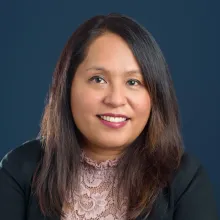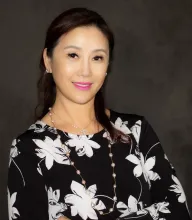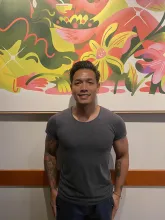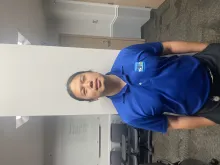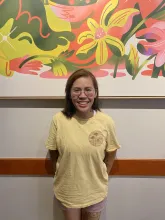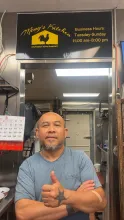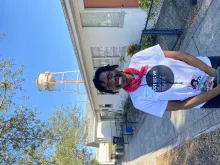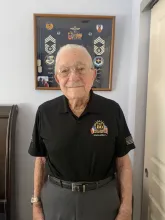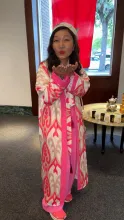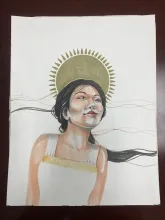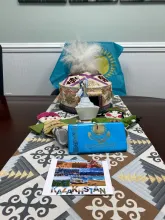Christine Malamanig Berk was born in Tamuning, Guam, in 1973. Christine briefly recollected fond memories of her early upbringing on the island before her family moved to California when she turned five years old. Christine cited familial trends and improved opportunities in the contiguous United States as reasons they left Guam. She recounted the cultural shock she experienced once she settled in California, and the various ways in which her family maintained her Guamanian and Filipino (her father’s side) heritage while living in California during this time. Christine attended California State University in Fresno, double majoring in Journalism and English. During college, she joined several organizations that connected her with other Asian communities. Christine emphasized how these experiences functioned as a “multicultural awakening” to embrace culture and promote diversity and inclusion, objectives she continued to pursue throughout her adult life. In 2008, after years working as a journalist in Sacramento and Kansas City, Christine moved to Florida to attend Florida Coastal School of Law in Jacksonville. She explained how the law school’s welcoming and multicultural environment motivated her to attend that institution specifically. Christine recounted her career as a lawyer, specifically how she has navigated the profession as an Asian American woman. In 2011, after completing law school, Christine moved to Orlando, immediately seeking communal and professional connections. As a result, she joined the Greater Orlando Asian American Bar Association (GOAABA) and served as its president circa 2014. Additionally, around this time, she joined the Asian American Chamber of Commerce, where she currently serves as president (as of 2025). In her discussion of both organizations, Christine outlined the organizations' missions, their significance to the Asian American community in Orlando, and what she has maintained and implemented while serving in various prominent positions, not only as president. Lastly, Christine shared her broader observations on the growing Asian community in Florida, the state’s larger changes since 2008, and the challenges it faces in the contemporary moment (2025).
Paulina Lu was born in Shanghai, China, in 1971. She recounted memories of her upbringing, particularly growing up in the hospital as her parents worked as physicians. At the age of eleven, the state-sponsored Chinese Ballet Society selected Paulina to attend the Shanghai Dance School, a boarding school in which students professionalize in ballet dancing. Paulina recalled her boarding school experience and what she learned about dance and Chinese culture during that time. She joined the Shanghai Dance Company after completing her education at boarding school, yearning to learn more about Western ballet following her tours outside China. As a result, in 1990, Paulina received several scholarships from American institutions to study dance, accepting the University of South Florida’s (USF) offer primarily because of the resemblance of the weather between Florida and Shanghai. Paulina performed in various locations during the 1990s, including the Splendid China theme park in Kissimmee. During this time, Paulina recognized the differences in professional dancing between China and the United States, particularly the financial struggles that accompanied pursuing a full-time professional dancing career. Thus, she attended Schiller International University, majoring in international business, to sustain herself economically. In 2000, she founded the Royal Ballet Academy in Celebration and discussed how her teaching mirrored and differed from her educational experiences in China. In 2007, she left the Royal Ballet Academy to work alongside her husband overseas, returning to Shanghai and establishing a dance school there. Once Paulina returned to Central Florida, she joined the Orlando Ballet Academy in 2013, teaching at that school until she retired from dance in 2017. . In her dancing retirement, she transitioned into the nonprofit world, supporting organizations such as the Greater Orlando Chinese Professional Association. Lastly, Paulina shared her broader observations about Florida and its cultural changes, continuities, and challenges over the past thirty-five years.
Gauen Lee was born in Cheongju, South Korea, in 2001. She recollected memories of her upbringing, particularly her fascination with living abroad and her frustration with adhering to cultural norms, such as respecting elders. The combination of these factors prompted her to leave South Korea and emigrate to Florida in 2018 through a student exchange program. She recounted several cultural shocks she experienced upon arriving in Spring Hills, Florida, from students brazenly disrespecting teachers to looser parent-child relations. She particularly remembered her struggles with the first American family the agency paired her with, as the grandmother refused to let Gauen speak Korean in an effort to strengthen her English. After completing high school, she attended Valencia College in Orlando, Florida. At Valencia, Gauen joined the Valencia Intercultural Student Association as a way to widen her cultural experience and avert boredom. Additionally, while in Orlando, Gauen joined the Orlando Korean Cultural Center (OKCC) and explained her reasons for joining, the organization’s mission, and her expanding role over the past three years. She has taught Korean classes to non-Korean speakers, detailing her methods and takeaways. Gauen discussed her visions for OKCC’s future, particularly maximizing the increasing influence of K-pop and K-culture in the United States as a way to expand the organization’s reach. Gauen attended the University of Florida in Gainesville, finishing her bachelor's degree in Information Systems in December 2024.
Daniel Lam was born in Providence, Rhode Island, in 1990. Daniel recounted his upbringing, particularly the cultural and ethnic challenges he faced growing up as a Cambodian American, as well as stories he learned from his family as refugees from the Khmer Rouge, Pol Pot Cambodian killings. Around 2005, Daniel and his family moved to Palm Coast, Florida, as his parents lost their jobs when Chinese and Mexican corporations acquired and relocated the Texas Instruments factory where they worked. In 2017, Daniel enlisted in the Air Force, serving as a C-17 mechanic. 2022, Daniel met his wife, Brittney, following her career in Boston. In Boston, Daniel expanded his culinary experience by tasting foods from various Asian cultures. 2024, Daniel returned to Florida with his wife to remain closer to family. During this time, Daniel and his wife launched their food vending business, Mae Tao & Son’s, as a way to expand Daniel’s culinary passion. Daniel shared his broader observations about Central Florida, noting that the centrality of food will continue to play a role in maintaining the region’s cultural diversity.
Henry Kwan was born in Winter Park, Florida, in 1988. His parents fled China in the early 1980s. Henry recollected stories his grandmother told about China’s authoritarian regime, particularly memories about Mao Zedong’s Cultural Revolution in the 1960s and 1970s. In addition to seeking economic prosperity, these conditions prompted Henry’s grandmother and parents to emigrate to the US during the early 1980s. His grandmother deeply influenced Henry’s childhood, citing her as why he learned Cantonese before English. Throughout the oral history, Henry emphasized the duality between his American and Chinese identities, associating more with the former yet always wondering about the latter, especially later in adulthood. After graduating from high school in 2006, Henry enlisted in the Marine Corps as a reservist, sharing his various motives for joining. In addition to recounting his basic training experience, Henry detailed several takeaways he learned about himself and the United States while serving as an Asian American. After he concluded his service in 2012, Henry fell into a depressive state, contemplating suicide at one point. He recalled how he overcame such emotions and navigated the broader cultural stigmas associated with mental health circa 2012. In 2014, Henry graduated from the University of Central Florida with a bachelor's in psychology. He discussed broader anti-Chinese sentiments in the US during the COVID-19 pandemic, and how he indirectly felt the influence in Orlando. In his broader observations about Orlando, he questioned the identity the city will embrace amidst the current (c. 2025) political climate. Additionally, he feared the increasing intensification of hurricanes and their economic and demographic impacts on the state while underlining inclusivity for all peoples in America.
Brittney Keophoxay-Lam was born in Woonsocket, Rhode Island, in 1993. She recollected stories that her family had passed down about their experiences in Laos, particularly how the Laotian Civil War, which lasted from the 1950s to the 1970s, affected them. Her father unofficially served in the Royal Lao Army and survived a harrowing incident in which he witnessed the death of his brothers, leaving him in a refugee camp in Nong Khai, Thailand. Brittney recalled her parents' immigrant experience and how the cultural mistranslations between Lao and America impacted her as a Laotian American at various phases in her life. She remembered how such a disconnect contributed to her family losing their home during the 2007-2008 recession, falling victim to a predatory lending scheme. Brittney reflected on the trauma from this incident and how it has inspired her to pursue law to protect other ethnic families from suffering a similar experience. She discussed how food proved critical in maintaining her Laotian cultural heritage in America and how the misappropriation of Lao food as Thai has motivated her to rectify the differences in their food vending business. Brittney recounted her collegiate experience in the Southern New Hampshire area, as well as her work as a paralegal during the COVID-19 Pandemic. Her father’s death in 2024 prompted her to move to Florida, as she sought to recover her mental health through the state’s longer daytime hours and warmer weather. In January 2025, Brittney and her husband, Daniel, launched Mae Tao & Son’s, a Laotian and Cambodian food vending business as a way to honor her father’s legacy, challenge the conflation between Laotian and Thai food, and promote her cultural heritage which often remains overlooked in the larger Asian cultural milieu. She discussed the early hardships of developing the business and what she seeks to accomplish over the next decade. Lastly, she shared her initial observations about Florida, how it compares to the Northeast, and what she hopes to achieve personally, professionally, and culturally in the state.
Asawin “AJ” Jockkeaw was born in Bangkok, Thailand, in 1970. AJ recollected memories of his formative years, particularly the linguistic challenges he faced when he and his family moved from Bangkok to Northern Thailand. At the age of eighteen, AJ worked as a professional musician, citing financial difficulties as the primary reason for performing in clubs and earning money instead of pursuing further education after high school. Continued economic hardships and improved working opportunities prompted AJ to leave Thailand and emigrate to Orlando, Florida, in 1998. AJ recounted his immigrant experience in Orlando, initially struggling with the linguistic and cultural barriers. After briefly performing for his mother’s church, AJ shifted his career to food service, beginning as a dishwasher and working his way up the professional ladder. After seven years, AJ reached the position of executive chef. He emphasized that working in several kitchens with other immigrant and ethnic individuals helped him acclimate to his new life in Orlando. In 2020, AJ established his restaurant, Meng’s Kitchen, and explained how the COVID Pandemic impacted this decision. AJ discussed how Meng’s Kitchen changed over the past five years, from different locations to expanding the staff from just himself to a group of five. Lastly, AJ shared his broader observations about Orlando and its cultural and culinary changes since 1998.
Melissa Jest was born on September 20, 1964, in Savannah, Georgia, but lived her childhood in Harlem, New York. She recounted her mixed experience growing up in Harlem, remembering how uplifting it felt being around a historically significant Black enclave, but also the pain of seeing her mother struggling to support two young children as a single parent. She briefly recalled her perspective on the 1976 Bicentennial, noting the lack of Black involvement and remembrance during the historical anniversary. Melissa attended the University of Florida (UF) during the late 1980s. In addition to describing her general experience at UF, she discussed in detail the student protests against the South African apartheid regime and how conflicting and revealing it proved for her as a Broadcasting Journalism major. Additionally, Melissa shared her time working as an Associate Producer of a consumer educational segment titled “12 On Your Side” for Channel 12 WTLV in Jacksonville after college. Lastly, Melissa explained her current (as of the interview’s recording) position with the African American Cultural Heritage Action Fund for the National Trust of Historic Preservation, specifically their efforts in supporting the Association to Preserve Eatonville Community (PEC).
Melvin “Mel” Jenner was born in Goodrich, North Dakota, in 1922. His family moved to Michigan when Mel turned four years old, and he recounted his upbringing. A fascination with airplanes led Mel to join the Michigan International Guard during high school. After the Japanese attacked Pearl Harbor on December 7, 1941, the federal government mobilized the National Guard, and Mel enlisted in the service. He recalled his military service in World War II, serving mainly as a left waist gunner in a B-17 bomber aircraft. Mel flew forty-six missions, including six over Berlin and his final one at Normandy on June 6, 1944. Mel continued his military service after World War II, participating in the Berlin Airlift in 1948 and 1949. McCoy Air Base marked Mel’s final duty station, and he recollected his occupation at the base and his general observations before the area turned into its present-day function as a civilian commercial airport. Mel stayed in Orlando after he retired from the military, emphasizing how the bass fishing scene and outdoor life attracted him to settle in Central Florida. Mel worked at Disney for over twenty years as a painter and tournament director for Disney’s bass fishing club. In 2024, as part of the 80th anniversary commemorations, Mel visited Normandy for the first time since the war. Lastly, he explained why he continues passing his story on to future generations.
Kymbat Iglikova was born in Talshik, Kazakhstan, in 1984. She recounted memories of her upbringing, particularly the uncertainty that followed Kazakhstan’s independence after the fall of the Soviet Union, as well as fond recollections of her parents and grandparents. Kymbat wished to pursue a career in chemistry; however, her mother discouraged her from working in such a field, citing geographical and gender concerns. Instead, her mother suggested that Kymbat pursue a career teaching English, recognizing the potential with increased globalization and companies investing in foreign areas, such as Kazakhstan. Kymbat followed her mother’s advice and graduated with a bachelor's degree in education, foreign languages, literature, and linguistics from Kokshetau State University. Ironically, this career path led to what her mother partly feared—moving away from home. In 2005, Kymbat participated in a student-teachers exchange program that provided opportunities to practice linguistics and teaching skills in another country, resulting in her departure from Kazakhstan and subsequent emigration to the United States. She spent two weeks in New York City, recounting a specific emotional memory that Kymbat credited as the reason why she ultimately stayed in the US. Kymbat requested that her agency transfer her to Florida, as she felt restricted in New York and wanted to reconnect with friends living in the Sunshine State, thereby rekindling her ties to Kazakhstan. Upon arriving in Florida, Kymbat founded Multilingual International Services and explained in extensive detail her inspirations to create the company, its purpose, its evolution, and how it intertwined with her other career in real estate. In 2019, Kymbat joined Orlando Fusion Fest, supporting their mission and expanding their programming to include Kazakhstan cultural showcases. Kymbat discussed what she has learned about Florida from her various professional experiences, including her linguistic company, real estate business, and Fusion Fest service. Additionally, given her intimate contact with recently arrived immigrants, Kymbat expounded on the current state of immigration in America (c. 2025) and how it differs from her personal experience twenty years ago. Lastly, she shared her broader observations about Central Florida, its cultural continuities, changes, and challenges since 2005.

